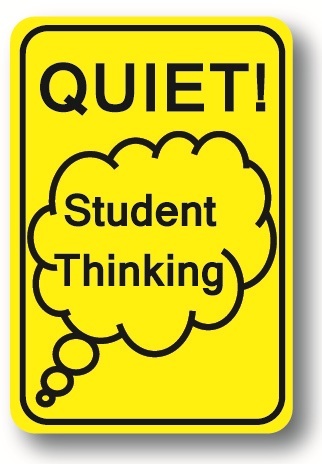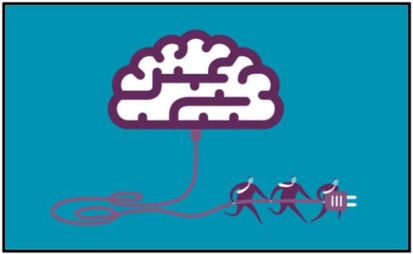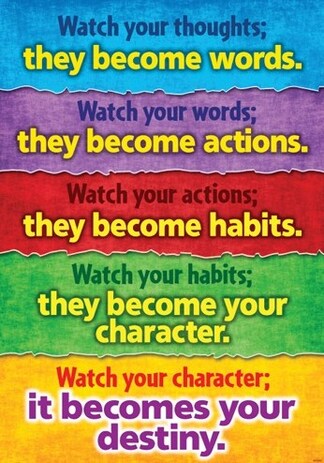
Congratulations on making it this far! 6th-Grade!!WOW!!! I am excited about the year ahead and I know that you are too. With some luck and a bit of planning it won't all be easy, and that's just as it should be.
6th-Grade is filled with new challenges, and every challenge is an opportunity for growth. Thank goodness!!!! I'd hate to think that any of us have already reached our peak.
Still, there is nothing - NOTHING - to worry about. You are in a good place and all of your teachers are here to support your growth.
In my experience, one of the things that worries students is grades. Grades are one form of feedback that you get on the work you complete, but they are only one. Still, because I know you want to do your very best, including on grades, I put together these tips to help you achieve your goal.
6th-Grade is filled with new challenges, and every challenge is an opportunity for growth. Thank goodness!!!! I'd hate to think that any of us have already reached our peak.
Still, there is nothing - NOTHING - to worry about. You are in a good place and all of your teachers are here to support your growth.
In my experience, one of the things that worries students is grades. Grades are one form of feedback that you get on the work you complete, but they are only one. Still, because I know you want to do your very best, including on grades, I put together these tips to help you achieve your goal.

Prepare to be Excellent:
Think about those words. Prepare to be excellent. Excellence takes preparation. It take practice. Good athletes know that. Good musicians know that. And, good students know that too.
If you are an athlete or a musician, then you know what I am talking about. Think about all of the hours you spend at soccer practice. Now, think about how many minutes you spend with the ball each game. In fact, it might not even add up to "minutes." If you are a musician, think about how many hours of preparation it takes to make a 3 minute piece of music sound awesome. The same goes for being an excellent student. It takes time. If you are willing to put in the time and the effort, you will be an excellent student.
Because I know that you are busy, busy, busy, the following are a few tips that can help you make the most of the time you spend becoming an awesome student. They are good study tips for all students no matter their age. Because of that, they should last you all the way through college. Experiment and pick the ones that work for you. A lot of 6th-Grade is finding what works for YOU. When you find something that works for you, commit to it. A commitment to do your best is a great start down the pathway to excellence.
Getting Good Grades:
Think about those words. Prepare to be excellent. Excellence takes preparation. It take practice. Good athletes know that. Good musicians know that. And, good students know that too.
If you are an athlete or a musician, then you know what I am talking about. Think about all of the hours you spend at soccer practice. Now, think about how many minutes you spend with the ball each game. In fact, it might not even add up to "minutes." If you are a musician, think about how many hours of preparation it takes to make a 3 minute piece of music sound awesome. The same goes for being an excellent student. It takes time. If you are willing to put in the time and the effort, you will be an excellent student.
Because I know that you are busy, busy, busy, the following are a few tips that can help you make the most of the time you spend becoming an awesome student. They are good study tips for all students no matter their age. Because of that, they should last you all the way through college. Experiment and pick the ones that work for you. A lot of 6th-Grade is finding what works for YOU. When you find something that works for you, commit to it. A commitment to do your best is a great start down the pathway to excellence.
Getting Good Grades:

1. Find somewhere quiet to study. This seems too obvious for words. If you find a quiet study space, not only will you be far less likely to succumb to all sorts of distractions, but entering a special practice area, whether it's a certain room or just a corner of the living room, will help prepare you mentally for the study time ahead. Mindful intention is everything, and having the ritual of going to the same place every time can help set that intention. Now, I know that many of you will say that you study best with music playing (I am guilty of this too!), but science says you are wrong. In order to make the best use of your time, find somewhere quiet to study.
2. Have your supplies nearby. "Really?", you say. Yes, really. Keep pens, pencils, scratch paper, computer, ruler, whatever supplies you need to be successful, nearby. Simple, right? Remember, your goal is to become excellent. Supplies are easy to forget, and if you have to go searching for them, that is time that you are not spending on becoming excellent.
2. Have your supplies nearby. "Really?", you say. Yes, really. Keep pens, pencils, scratch paper, computer, ruler, whatever supplies you need to be successful, nearby. Simple, right? Remember, your goal is to become excellent. Supplies are easy to forget, and if you have to go searching for them, that is time that you are not spending on becoming excellent.

3. Technology can be an amazing study aid — as long as you don't spend too much time with it or allow it to distract you from your goals. If you learn best by watching a Khan Academy video or playing an educational computer game, I say more power to you. But beware of endless hours of cute pet videos or social computer games. And, importantly, please don't use "screen time" as a reward for completion of your homework. Too often, screen time used as a reward just encourages students to rush through assignments. Commit to excellence in your work. At the same time...

4. Study smarter, not necessarily harder or longer. One of the character traits I appreciate more than any other is the willingness to work hard. There is a saying, however, and it goes like this: "It's not the hours you put in, it's what you put in the hours."
Science tells us that we have a limited amount of willpower, and sitting still for long periods is hard. Moreover, we typically remember best the first and the last things we study so, oddly, the longer we study, the more we forget. So that you can make the most of the time you have, study for multiple short bursts of five to fifteen minutes. Studying in short bursts helps us remember more. And, best of all, there are multiple opportunities for short bursts of study throughout your day:
Science tells us that we have a limited amount of willpower, and sitting still for long periods is hard. Moreover, we typically remember best the first and the last things we study so, oddly, the longer we study, the more we forget. So that you can make the most of the time you have, study for multiple short bursts of five to fifteen minutes. Studying in short bursts helps us remember more. And, best of all, there are multiple opportunities for short bursts of study throughout your day:
- Use waiting time to study. While waiting for others to finish work in class, during advisory, during lunch, while in the car, waiting in line, etc., Those are all great opportunities to do a quick study session. And, when you take advantage of those opportunities it might mean less studying at home.
- Study the same information at different times of the day. By reviewing material at different times in the day, you cement the information in your long-term memory.
- Only take notes on information that you don’t already know. Making notes in the margins of handouts or creating note cards are great ways to help cement new information. Practice writing down the things that you think are the most important, things that you deem worthy of being on a test. Identifying those things is a skill in itself. This is called precision note taking. Afterwards, practice going over the material that is new to you.
- Make your notes brief and precise. Study your notes as soon as you get home. This helps in memorizing the material.

5. Begin with the end in mind. Plan for your success. That's right. Before you sit down, make a plan for each study session. Set goals. I always tell my athletes (and my students), "Play to your strengths. Work on your weaknesses." Think about what you need to work on to improve in each class and identify key objectives or goals for the study time ahead of you. Doing so helps your brain focus.
6. Don't always start at the beginning every time. (Very much related to 5) Remember what I said about maximizing your time and your willpower? Because we all have limited time and willpower, it can sometimes help to begin with the most difficult problems of the day.
If you are comfortable with introductory concepts, identify a challenge and begin there. Break down the challenge into smaller, more manageable steps and work through mastering the steps. Think about different approaches as you work through the challenge. Take it slow and be thorough. If you start to get frustrated, and we all know what that's like, come back to the problem later - even tomorrow. Chances are it will be much easier the next time around. Taking this approach, you will see more gains and you will see them more quickly.
7. Challenge yourself — physically. Science tells us that if you add a physical challenge to a difficult task, such as standing on one leg while trying to memorize a poem, your brain is likely to start carving out new neural pathways — and the original task will be easier when you return to doing just that.
8. Take the extra step. The difference between ordinary and extraordinary is that little extra. Challenge yourself. Be extraordinary. When working with rubrics, go above and beyond the basic expectations outlined in the rubric. When writing, take the time to edit for any errors, even writing a second or third draft so that you show your best effort. If you have an opportunity to earn extra credit, take it.
9. Reward hard work — in positive ways — to help your brain automate good habits. That sounds like out-and-out bribery but, again, it's science! Finding something that your brain likes helps it remember, and habits are a sort of memory. Create good habits with good, healthy rewards. And, talking about health...
6. Don't always start at the beginning every time. (Very much related to 5) Remember what I said about maximizing your time and your willpower? Because we all have limited time and willpower, it can sometimes help to begin with the most difficult problems of the day.
If you are comfortable with introductory concepts, identify a challenge and begin there. Break down the challenge into smaller, more manageable steps and work through mastering the steps. Think about different approaches as you work through the challenge. Take it slow and be thorough. If you start to get frustrated, and we all know what that's like, come back to the problem later - even tomorrow. Chances are it will be much easier the next time around. Taking this approach, you will see more gains and you will see them more quickly.
7. Challenge yourself — physically. Science tells us that if you add a physical challenge to a difficult task, such as standing on one leg while trying to memorize a poem, your brain is likely to start carving out new neural pathways — and the original task will be easier when you return to doing just that.
8. Take the extra step. The difference between ordinary and extraordinary is that little extra. Challenge yourself. Be extraordinary. When working with rubrics, go above and beyond the basic expectations outlined in the rubric. When writing, take the time to edit for any errors, even writing a second or third draft so that you show your best effort. If you have an opportunity to earn extra credit, take it.
9. Reward hard work — in positive ways — to help your brain automate good habits. That sounds like out-and-out bribery but, again, it's science! Finding something that your brain likes helps it remember, and habits are a sort of memory. Create good habits with good, healthy rewards. And, talking about health...

10. Be good to yourself - and your brain. Eat right. Exercise. Hydrate - so important to keeping the brain happy! Sleep. Preferably not in class. With all that you do, it's easy to neglect any one or more of these things. Don't. They are all important to you and to your performance.
In 6th-Grade, you should be building good habits. Begin by building good habits that respect your brain. Lastly, do activities that are fun and make you feel good. Whenever you feel good, you do better in school. Stay positive and be happy. If at first you don’t succeed, try, try again.
11. Be present. We all like to think that we are great multi-taskers. We are not. And, once again, science is going to back me up on this. When we think we are multi-tasking, our brain is just switching back and forth between different tasks. Sometimes we make that switch really quickly, but making quick switches sure can confuse things. You will do better to develop your powers of concentration.
How do you do that? Practice concentrating, of course. When you are in a difficult class, sit up and lean forward in your seat. Practice that. It is a great skill that will serve you well throughout your life. More, it sends a powerful signal that you care and that you want to be excellent. Still, for any number of reasons, we all miss things in conversation and in class. If that happens, rather than fall behind, ask a teacher for additional help. Your teachers love the subjects they teach. They love kids. They love their jobs. They love to help.
In 6th-Grade, you should be building good habits. Begin by building good habits that respect your brain. Lastly, do activities that are fun and make you feel good. Whenever you feel good, you do better in school. Stay positive and be happy. If at first you don’t succeed, try, try again.
11. Be present. We all like to think that we are great multi-taskers. We are not. And, once again, science is going to back me up on this. When we think we are multi-tasking, our brain is just switching back and forth between different tasks. Sometimes we make that switch really quickly, but making quick switches sure can confuse things. You will do better to develop your powers of concentration.
How do you do that? Practice concentrating, of course. When you are in a difficult class, sit up and lean forward in your seat. Practice that. It is a great skill that will serve you well throughout your life. More, it sends a powerful signal that you care and that you want to be excellent. Still, for any number of reasons, we all miss things in conversation and in class. If that happens, rather than fall behind, ask a teacher for additional help. Your teachers love the subjects they teach. They love kids. They love their jobs. They love to help.
